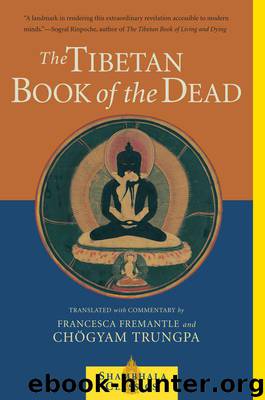The Tibetan Book of the Dead: The Great Liberation through Hearing in the Bardo (Shambhala Classics) by Trungpa Chogyam & Fremantle Francesca

Author:Trungpa, Chogyam & Fremantle, Francesca [Trungpa, Chogyam]
Language: eng
Format: azw3
Publisher: Shambhala Publications
Published: 2010-09-28T03:00:00+00:00
on the luminous light-path of the four wisdoms combined,
may the conquerors, the five families, go before me,
the consorts of the five families behind me;
save me from the light-paths of the six impure realms,
help me to cross the bardo’s dangerous pathway
and bring me to the five pure buddharealms.”
By saying this inspiration-prayer, the superior person recognizes his own projections, and merging with non-duality becomes a buddha; the average person recognizes himself through intense devotion and attains liberation; even the inferior person prevents rebirth in the six realms by the purifying power of the prayer, and understanding the meaning of the four wisdoms combined, attains enlightenment by the passage-way of Vajrasattva. By being shown clearly and precisely in this way, many sentient beings will recognize and be liberated.
But some, such as inferior people in uncivilized places, and wicked people who have no experience of dharma at all, and those who have let their samaya practice degenerate, are confused by their karma, and do not recognize even when they are shown, but wander downwards. So, on the seventh day, the vidyādharas will come from the Pure Realm of Space to invite them, and at the same time the light-path of the animals, produced from the emotion of ignorance, will also meet them. At that time, to show him again, one should call the dead person by name and say these words:
“O child of noble family, listen without distraction. On the seventh day a pure, many colored light will shine in your unconscious mind, and the vidyādharas will come from the Pure Realm of Space to invite you. In the center of a maṇḍala filled with rainbow light, he who is called the Unsurpassable Fully Developed Vidyādhara, Lotus Lord of Dance, will appear, his body bright with the five colors, embracing his consort the Red Ḍākinī, dancing with a crescent knife and a skull full of blood, gesturing and gazing at the sky.
“From the east of the maṇḍala he who is called the Vidyādhara Established in the Stages11 will appear, white in color, with a radiant smiling face, embracing his consort the White Ḍākinī, dancing with a crescent knife and a skull full of blood, gesturing and gazing at the sky.
“From the south of the maṇḍala he who is called the Lord of Life Vidyādhara will appear, yellow in color, with beautiful form, embracing his consort the Yellow Ḍākinī, dancing with a crescent knife and a skull full of blood, gesturing and gazing at the sky.
“From the west of the maṇḍala he who is called the Great Symbol Vidyādhara will appear, red in color, with a radiant smiling face, embracing his consort the Red Ḍākinī, dancing with a crescent knife and a skull full of blood, gesturing and gazing at the sky.
“From the north of the maṇḍala he who is called the Spontaneously Arisen Vidyādhara will appear, green in color, his expression both angry and smiling, embracing his consort the Green Ḍākinī, dancing with a crescent knife and a skull full of blood, gesturing and gazing at the sky.
Download
This site does not store any files on its server. We only index and link to content provided by other sites. Please contact the content providers to delete copyright contents if any and email us, we'll remove relevant links or contents immediately.
| Confucianism | Feng Shui |
| I Ching | Jainism |
| Karma | Shintoism |
| Sikhism | Tao Te Ching |
| Taoism | Tibetan Book of the Dead |
| Zoroastrianism |
The Tao of Physics by Fritjof Capra(2272)
Human Design by Chetan Parkyn(2068)
The Diamond Cutter by Geshe Michael Roach(2059)
Feng Shui by Stephen Skinner(1939)
The Alchemy of Sexual Energy by Mantak Chia(1855)
Tao Te Ching by Lao Tzu(1835)
365 Tao: Daily Meditations by Ming-Dao Deng(1616)
Tao Tantric Arts for Women by Minke de Vos(1592)
Sun Tzu's The Art of War by Giles Lionel Minford John Tzu Sun(1538)
Sidney Sheldon (1982) Master Of The Game by Sidney Sheldon(1514)
Buddhism 101 by Arnie Kozak(1508)
Karma-Yoga and Bhakti-Yoga by Swami Vivekananda(1492)
The Analects of Confucius by Burton Watson(1431)
The Art of War Other Classics of Eastern Philosophy by Sun Tzu Lao-Tzu Confucius Mencius(1425)
The Way of Chuang Tzu by Thomas Merton(1361)
Tao te ching by Lao Tzu(1357)
The New Bohemians Handbook by Justina Blakeney(1352)
The Sayings Of by Confucius(1312)
Bless This House by Donna Henes(1267)
